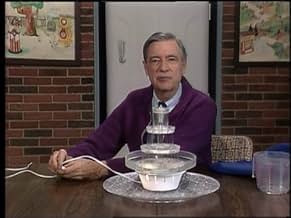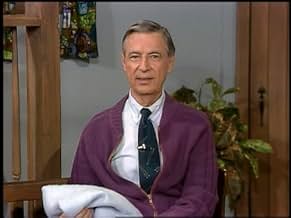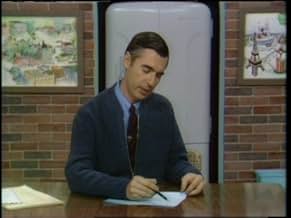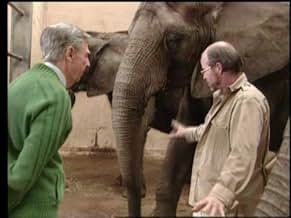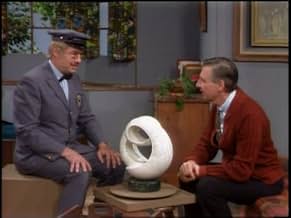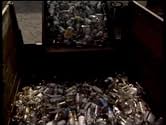Fred Rogers explora vários temas para o público jovem através de atuações e música, tanto no seu mundo como no bairro Make-Believe.Fred Rogers explora vários temas para o público jovem através de atuações e música, tanto no seu mundo como no bairro Make-Believe.Fred Rogers explora vários temas para o público jovem através de atuações e música, tanto no seu mundo como no bairro Make-Believe.
- Indicado para 3 Primetime Emmys
- 8 vitórias e 66 indicações no total
Explorar episódios
Avaliações em destaque
Never underestimate the power of Public Television. Fred Rogers makes children feel comfortable and loved, even if their home life isn't perfect. They don't really show the oldest episodes on PBS, but even back in 1968, Mr. Rogers was having episodes about difficult topics, one episode from the aforementioned year about the assassination of Bobby Kennedy. One might jeer at Mr. Rogers' style of taking his fancy jacket off and changing into a sweater, or changing from his business shoes into tennis shoes, but it gives the feeling comfort in a weary world.
10kerose
At age 52, I have fond memories of watching Mr. Rogers' Neighborhood when public television was in its infancy. Fred Rogers not only talked about feelings, but he also addressed young people in a way that respected us as intelligent people in our own right. Sure, he had the Neighborhood of Make Believe, and the entity he referred to as his "television house." The best part is that on one episode he addressed us and said, "Here's why you won't see me in the neighborhood of make believe" and went on to describe how he works with the puppets behind the scenes. In another episode, he shows the studio and how they put the show together.
One memorable episode dealt with Mr. Rogers getting a traffic ticket and going before the judge - he's human, too.
Mr. Rogers always made it clear that it is good to play and to pretend. I strive to be the kind person that Mr. Rogers was - I want to have that same calm demeanor.
Long live Fred Rogers in our hearts. I wish I could have met the man.
One memorable episode dealt with Mr. Rogers getting a traffic ticket and going before the judge - he's human, too.
Mr. Rogers always made it clear that it is good to play and to pretend. I strive to be the kind person that Mr. Rogers was - I want to have that same calm demeanor.
Long live Fred Rogers in our hearts. I wish I could have met the man.
Like many kids of the early 70's, I used to watch the PBS trinity. Sesame Street taught us about letters and numbers while The Electric Company taught us about reading. Mr. Rogers had the hardest job of all though; he taught us about feelings, socialization and the adult world.
Everything about the show was crafted to be warm and friendly without being boring or patronizing. Mr. Roger's tools were puppets, videos and original music, all of which were used to great effect. Even so, the show was about how people feel and relate, and for that it needed a Human element. Mr. Rogers and his neighbors were that element, and they were expert teachers.
As the focal-point of the show ("star" just doesn't seem right), Mr. Rogers always spoke directly to the camera, as if speaking directly to the children who were watching. His manner was always calm and inviting, unlike a certain purple dinosaur whose hyperactive manner almost demands that you like him. More importantly, Mr. Rogers always conveyed an air of dignity. Contrast that with many modern shows that tend to portray adults as fools. That may be good for a cheap laugh, but kids know that adults are in charge. Who wants a fool to be in charge? Kids shows will come and go, but there will never be another Mr. Rogers. He didn't want to sell the kids things, he didn't expect them to be "cool," and he didn't want to replace their parents. he just wanted to be their neighbor.
Everything about the show was crafted to be warm and friendly without being boring or patronizing. Mr. Roger's tools were puppets, videos and original music, all of which were used to great effect. Even so, the show was about how people feel and relate, and for that it needed a Human element. Mr. Rogers and his neighbors were that element, and they were expert teachers.
As the focal-point of the show ("star" just doesn't seem right), Mr. Rogers always spoke directly to the camera, as if speaking directly to the children who were watching. His manner was always calm and inviting, unlike a certain purple dinosaur whose hyperactive manner almost demands that you like him. More importantly, Mr. Rogers always conveyed an air of dignity. Contrast that with many modern shows that tend to portray adults as fools. That may be good for a cheap laugh, but kids know that adults are in charge. Who wants a fool to be in charge? Kids shows will come and go, but there will never be another Mr. Rogers. He didn't want to sell the kids things, he didn't expect them to be "cool," and he didn't want to replace their parents. he just wanted to be their neighbor.
Fred McFeely Rogers. A brilliant man. In a time when children were largely ignored (and even feared at times by adults) this man had the good sense to realize one simple fact: children are people too! I am 20 years old and I am PROUD to claim that I watched Mr. Rogers every day growing up. All I watched when I was little was Mr. Rogers, Sesame Street, and Today's Special. Those were children's shows that made a child feel good. Unlike the wave of horrible children's shows that came in a few years ago (any show ending with -mon comes to mind), these shows were real. Mr. Rogers was real. You could almost believe that he really was your neighbor. He seemed like the kind of man you would see every day. But there was a huge difference: he loved and cared about children. Mr. Rogers has taken a lot of flack for his feelings towards children. How sad is it that feelings such as kindness, love, and sympathy are regarded with suspicion? Despite hundreds of attacks, despite cries of "pedophile" or "child raper", this man never wavered in his beliefs. He never backed down from what he felt was right. Some people (including 1 person on here) have wondered about the origin of the name McFeely. Well, I will tell you. It's not a hidden reference to a supposed desire to "feel" children. McFeely is his middle name, his mother's maiden name, and his maternal grandfather's name. His grandfather was responsible for some of Mr. Rogers' trademark lines: "I like you just the way you are", among others. Some people may know the song "Mr. Rogers" by Korn. Jonathan Winters, the lead singer and songwriter, screams at him "I hate you!" "I wish I never would have watched you" and "child f----r" to name a few. The reason Winters had so much hostility towards him is that as a child when he heard Mr. Rogers' kind words, he thought it meant that if you were nice to people, they would be nice to you. He thought everyone in the world was like Mr. Rogers. Unfortunately, he was wrong, and Winters was molested on many different occasions by a neighbor. Very sad, yes, but he was only projecting his anger onto this kind man. I think even Winters realizes that he really doesn't blame Fred Rogers for what happened to him. In conclusion, I'd just like to say thank you to Fred Rogers for giving so much of yourself to us and asking so very little in return. God bless you, Mr. Rogers, and my prayers go out to his family and friends.
Mr. Rogers did what few artists have done in the history of mankind - strengthened and supported his audience so profoundly and so generously that he became a transformative force in their lives. I feel fortunate to have learned from him. In all too many homes, Mr. Rogers was and is the only voice of understanding, gentleness and positive reinforcement. Imagine how different our world would be if more young people could be exposed to his philosophy of acceptance and love.
There are so many children who never hear their parents say the words "I love you" - not once, not ever. And then they hear Mr. Rogers sing of all the ways people say "I love you," like "the cooking way" and "the eating way," and it's a comfort and reassurance beyond words. No other public figure provides this kind of life-changing insight to the people most in need.
On behalf of everyone you helped, of all the souls you touched in a badly damaged world, Mr. Rogers - we thank you, and we love you.
There are so many children who never hear their parents say the words "I love you" - not once, not ever. And then they hear Mr. Rogers sing of all the ways people say "I love you," like "the cooking way" and "the eating way," and it's a comfort and reassurance beyond words. No other public figure provides this kind of life-changing insight to the people most in need.
On behalf of everyone you helped, of all the souls you touched in a badly damaged world, Mr. Rogers - we thank you, and we love you.
Você sabia?
- CuriosidadesMr. Rogers always explained to the audience what he was doing when he fed his fish. This was in response to a piece of mail from a blind girl who wanted to know when it happened on each episode.
- Erros de gravaçãoIn the 1979-1981 episodes when Mr. Rogers takes off his sweater and closes the closet door, he'd often close it too fast so it came open a ways, but then the closet door begins to close on its own, as if someone were behind the door pulling it closed.
- Citações
Mr. Rogers: You make each day a special day. You know how, by just your being you. There's only one person in this whole world like you. And people can like you exactly as you are.
- Cenas durante ou pós-créditosRight before the end credits of "Conflict" #1525, a message appears on screen that says, "And they shall beat their swords into plowshares. And their spears into pruning forks; Nation shall not lift up sword against nation. Neither shall they learn war anymore".
- Versões alternativasVarious theme-week episodes were released to video in the late-1980s in a special format. For instance, the week of "Day Care and Night Care" (#1516-1520) was released to video under the title "When Parents Are Away", and featured the Neighborhood of Make-Believe segments, edited into new segments featuring Mr. Rogers, as well as old segments like him visiting the day care home. In the old version, Fred meets Mr. McFeely at Brockett's bakery and they go to the day care home together. But in the video version, Mr. McFeely visits Mr. Rogers from Brockett's bakery and they leave from the house.
- ConexõesEdited into Commercial Entertainment Product (1992)
- Trilhas sonorasWon't You Be My Neighbor?
Performed by Fred Rogers
Principais escolhas
Faça login para avaliar e ver a lista de recomendações personalizadas
Detalhes
- Tempo de duração30 minutos
- Cor
- Proporção
- 1.33 : 1
Contribua para esta página
Sugerir uma alteração ou adicionar conteúdo ausente

Principal brecha
By what name was Mister Rogers' Neighborhood (1968) officially released in India in English?
Responda







